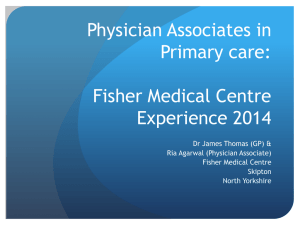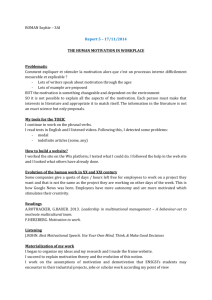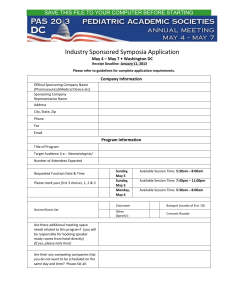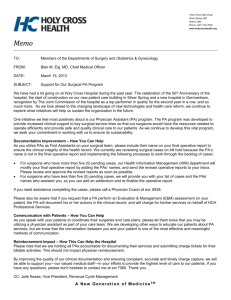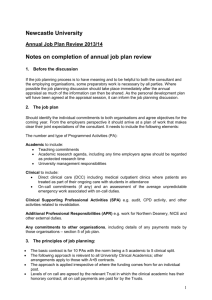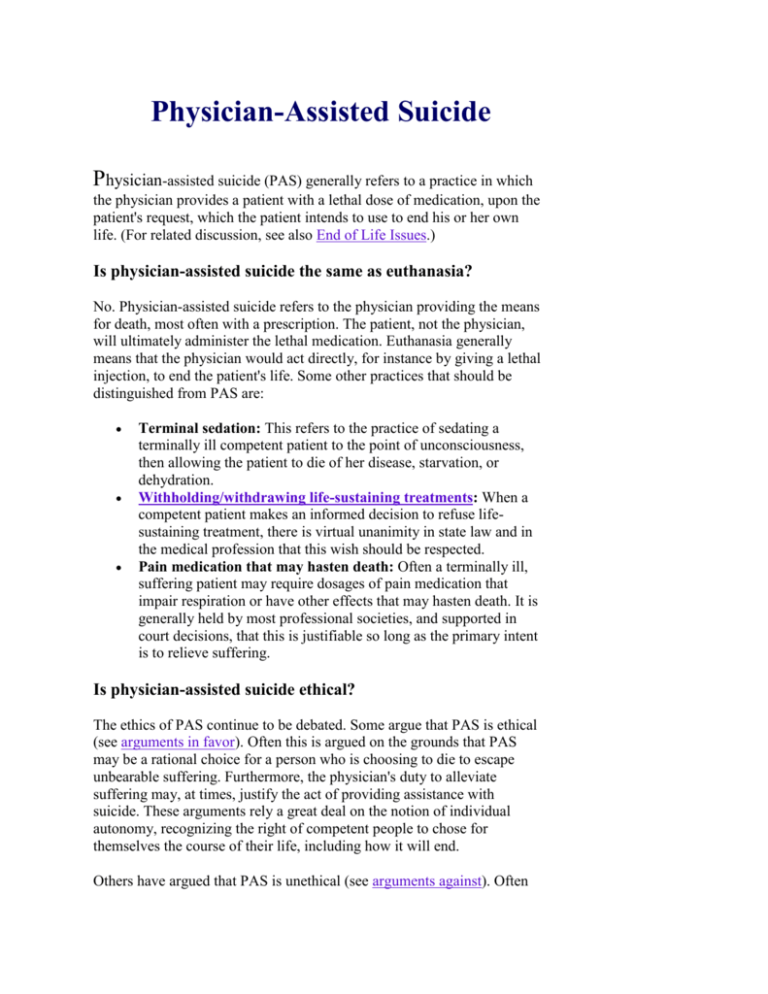
Physician-Assisted Suicide
Physician-assisted suicide (PAS) generally refers to a practice in which
the physician provides a patient with a lethal dose of medication, upon the
patient's request, which the patient intends to use to end his or her own
life. (For related discussion, see also End of Life Issues.)
Is physician-assisted suicide the same as euthanasia?
No. Physician-assisted suicide refers to the physician providing the means
for death, most often with a prescription. The patient, not the physician,
will ultimately administer the lethal medication. Euthanasia generally
means that the physician would act directly, for instance by giving a lethal
injection, to end the patient's life. Some other practices that should be
distinguished from PAS are:
Terminal sedation: This refers to the practice of sedating a
terminally ill competent patient to the point of unconsciousness,
then allowing the patient to die of her disease, starvation, or
dehydration.
Withholding/withdrawing life-sustaining treatments: When a
competent patient makes an informed decision to refuse lifesustaining treatment, there is virtual unanimity in state law and in
the medical profession that this wish should be respected.
Pain medication that may hasten death: Often a terminally ill,
suffering patient may require dosages of pain medication that
impair respiration or have other effects that may hasten death. It is
generally held by most professional societies, and supported in
court decisions, that this is justifiable so long as the primary intent
is to relieve suffering.
Is physician-assisted suicide ethical?
The ethics of PAS continue to be debated. Some argue that PAS is ethical
(see arguments in favor). Often this is argued on the grounds that PAS
may be a rational choice for a person who is choosing to die to escape
unbearable suffering. Furthermore, the physician's duty to alleviate
suffering may, at times, justify the act of providing assistance with
suicide. These arguments rely a great deal on the notion of individual
autonomy, recognizing the right of competent people to chose for
themselves the course of their life, including how it will end.
Others have argued that PAS is unethical (see arguments against). Often
these opponents argue that PAS runs directly counter to the traditional
duty of the physician to preserve life. Furthermore, many argue if PAS
were legal, abuses would take place. For instance, the poor or elderly
might be covertly pressured to chose PAS over more complex and
expensive palliative care options.
What are the arguments in favor of PAS?
Those who argue that PAS is ethically justifiable offer the following sorts
of arguments:
1. Respect for autonomy: Decisions about time and circumstances
death are very personal. Competent person should have right to
choose death.
2. Justice: Justice requires that we "treat like cases alike."
Competent, terminally ill patients are allowed to hasten death by
treatment refusal. For some patients, treatment refusal will not
suffice to hasten death; only option is suicide. Justice requires that
we should allow assisted death for these patients.
3. Compassion: Suffering means more than pain; there are other
physical and psychological burdens. It is not always possible to
relieve suffering. Thus PAS may be a compassionate response to
unbearable suffering.
4. Individual liberty vs. state interest: Though society has strong
interest in preserving life, that interest lessens when person is
terminally ill and has strong desire to end life. A complete
prohibition on assisted death excessively limits personal liberty.
Therefore PAS should be allowed in certain cases.
5. Openness of discussion: Some would argue that assisted death
already occurs, albeit in secret. For example, morphine drips
ostensibly used for pain relief may be a covert form of assisted
death or euthanasia. That PAS is illegal prevents open discussion,
in which patients and physicians could engage. Legalization of
PAS would promote open discussion.
What are the arguments against PAS?
Those that argue that PAS should remain illegal often offer arguments
such as these:
1. Sanctity of life: This argument points out strong religious and
secular traditions against taking human life. It is argued that
assisted suicide is morally wrong because it contradicts these
beliefs.
2. Passive vs. Active distinction: The argument here holds that there
is an important difference between passively "letting die" and
actively "killing." It is argued that treatment refusal or withholding
treatment equates to letting die (passive) and is justifiable, whereas
PAS equates to killing (active) and is not justifiable.
3. Potential for abuse: Here the argument is that certain groups of
people, lacking access to care and support, may be pushed into
assisted death. Furthermore, assisted death may become a costcontainment strategy. Burdened family members and health care
providers may encourage option of assisted death. To protect
against these abuses, it is argued, PAS should remain illegal.
4. Professional integrity: Here opponents point to the historical
ethical traditions of medicine, strongly opposed to taking life. For
instance, the Hippocratic oath states, "I will not administer poison
to anyone where asked," and "Be of benefit, or at least do no
harm." Furthermore, major professional groups (AMA, AGS)
oppose assisted death. The overall concern is that linking PAS to
the practice of medicine could harm the public's image of the
profession.
5. Fallibility of the profession: The concern raised here is that
physicians will make mistakes. For instance there may be
uncertainty in diagnosis and prognosis. There may be errors in
diagnosis and treatment of depression, or inadequate treatment of
pain. Thus the State has an obligation to protect lives from these
inevitable mistakes.
Is PAS illegal?
In most states, including the state of Washington, aiding in a suicide is a
crime, while suicide or attempted suicide itself is not illegal. The state of
Oregon is the only state that currently has legalized PAS.
However, several major court decisions have been made regarding PAS.
In the case of Compassion in Dying v. Washington, the Ninth US Circuit
Court of Appeals held that individuals have a right to choose how and
when they die. Later, the Second Circuit Court found a New York law on
PAS in conflict with the 14th amendment, which says that no state shall
"deny to any person within its jurisdiction the equal protection of the
laws." The Court held that competent patients were being treated
differently than incompetent patients. The US Supreme Court has ruled
that there is no constitutional right to assisted suicide, and made a legal
distinction between refusal of treatment and PAS. However, the Court also
left the decision of whether to legalize PAS up to each individual state.
There have also been a couple of high-profile cases related to specific
PAS incidents. Dr. Timothy Quill was investigated but not indicted for his
participation in the suicide of a patient after he published his account of
the incident. In November of 1998, 60 Minutes aired a tape of Dr. Jack
Kevorkian administering a lethal injection. His patient, 52 year-old
Thomas Youk, suffered from Amyotrophic Lateral Sclerosis (ALS),
otherwise known as Lou Gehrig's Disease. As a result of the show,
Kevorkian was tried for first degree murder in Oakland County, Michigan.
Prosecutors argued that, in giving a lethal injection, Kevorkian stepped
over the line of PAS into euthanasia, and that his actions amounted to
murder. Kevorkian was convicted of second degree murder, and is
currently serving a 10 to 25 year prison sentence.
What does the medical profession think of PAS?
Surveys of individual physicians show that half believe that PAS is
ethically justifiable in certain cases. However, professional organizations
such as the American Medical Association have generally argued against
PAS on the grounds that it undermines the integrity of the profession.
Surveys of physicians in practice show that about 1 in 5 will receive a
request for PAS sometime in their career. Somewhere between 5-20% of
those requests are eventually honored.
What do patients and the general public think of PAS?
Surveys of patients and members of the general public find that the vast
majority think that PAS is ethically justifiable in certain cases, most often
those cases involving unrelenting suffering.
What should I do if a patient asks me for assistance in
suicide?
One of the most important aspects of responding to a request for PAS is to
be respectful and caring. Virtually every request represents a profound
event for the patient, who may have agonized over his situation and the
possible ways out. The patient's request should be explored, to better
understand its origin, and to determine if there are other interventions that
may help ameliorate the motive for the request. In particular, one should
address:
1. motive and degree of suffering: are there physical or emotional
symptoms that can be treated?
2. psychosocial support: does the patient have a system of
psychosocial support, and has she discussed the plan with them?
accuracy of prognosis: every consideration should be given to
acquiring a second opinion to verify the diagnosis and prognosis.
3. degree of patient understanding: the patient must understand the
disease state and expected course of the disease. This is critical
since patient may misunderstand clinical information. For instance,
it is common for patients to confuse "incurable" cancer with
"terminal" cancer.
What if the request persists?
If a patient's request for aid-in-dying persists, each individual clinician
must decide his or her own position and choose a course of action that is
ethically justifiable. Careful reflection ahead of time can prepare one to
openly discuss your position with the patient, acknowledging and
respecting difference of opinion when it occurs. Organizations exist which
can provide counseling and guidance for terminally ill patients. No
physician, however, should feel forced to supply assistance if he or she is
morally opposed to PAS.
Clarence H. Braddock III, MD, MPH
Project Director, Bioethics Education Project
Faculty, Departments of Medicine and Medical History and Ethics
with Mark R. Tonelli, MD, MA
Assistant Professor, Pulmonary and Critical Care Medicine
©1998, University of Washington. All Rights Reserved.
Send comments to bioethx@u.washington.edu
Last date modified: October, 2001
If this site is still available, it can be found at
http://eduserv.hscer.washington.edu/bioethics/topics/pas.html



